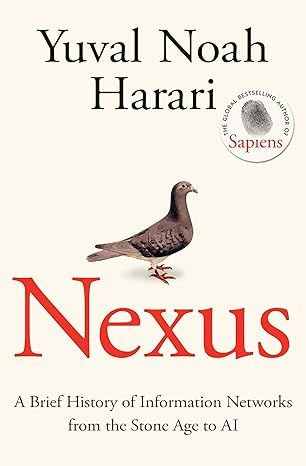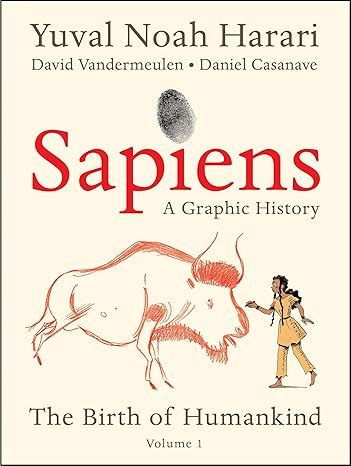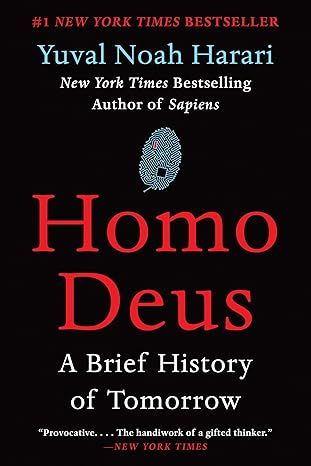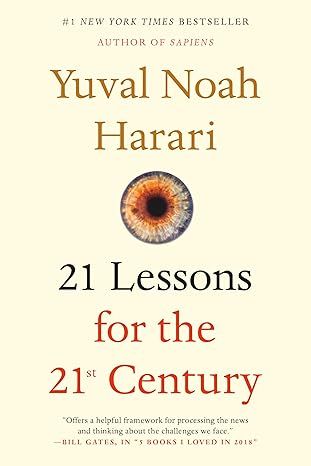Nexus
4.3 out of 5
306 global ratings
#1 NATIONAL BESTSELLER • NEW YORK TIMES BESTSELLER • From the author of Sapiens comes the groundbreaking story of how information networks have made, and unmade, our world.
“Masterful and provocative.”—Mustafa Suleyman
For the last 100,000 years, we Sapiens have accumulated enormous power. But despite all our discoveries, inventions and conquests, we now find ourselves in an existential crisis. The world is on the verge of ecological collapse. Misinformation abounds. And we are rushing headlong into the age of AI – a new information network that threatens to annihilate us. If we are so wise, why are we so self-destructive?
NEXUS considers how the flow of information has shaped us, and our world. Taking us from the Stone Age through the Bible, early modern witch-hunts, Stalinism, Nazism and the resurgence of populism today, Yuval Noah Harari asks us to consider the complex relationship between information and truth, bureaucracy and mythology, wisdom and power. He explores how different societies and political systems have wielded information to achieve their goals, for good and ill. And he addresses the urgent choices we face as non-human intelligence threatens our very existence.
Information is not the raw material of truth; neither is it a mere weapon. NEXUS explores the hopeful middle ground between these extremes, and of rediscovering our shared humanity.
528 pages,
Kindle
Audiobook
Hardcover
Paperback
Audio CD
First published September 5, 2024
ISBN 9781911717096
About the authors
Yuval Noah Harari
Prof. Yuval Noah Harari (born 1976) is a historian, philosopher and the bestselling author of 'Sapiens: A Brief History of Humankind' (2014); 'Homo Deus: A Brief History of Tomorrow' (2016); '21 Lessons for the 21st Century' (2018); the children's series 'Unstoppable Us' (launched in 2022); and 'Nexus: A Brief History of Information Networks from the Stone Age to AI' (2024). He is also the creator and co-writer of 'Sapiens: A Graphic History': a radical adaptation of 'Sapiens' into a graphic novel series (launched in 2020), which he published together with comics artists David Vandermeulen (co-writer) and Daniel Casanave (illustrator). These books have been translated into 65 languages, with 45 million copies sold, and have been recommended by Barack Obama, Bill Gates, Natalie Portman, Janelle Monáe, Chris Evans and many others. Harari has a PhD in History from the University of Oxford, is a Lecturer at the Hebrew University of Jerusalem's History department, and is a Distinguished Research Fellow at the University of Cambridge’s Centre for the Study of Existential Risk. Together with his husband, Itzik Yahav, Yuval Noah Harari is the co-founder of Sapienship: a social impact company that advocates for global collaboration, with projects in the realm of education and storytelling.
Read more
Reviews
Tracy
5
Informed, Realistic Perspective on the AI Revolution and Its Dangers
Reviewed in the United States on September 21, 2024
Verified Purchase
Harari outlines the historical context of some of the most important types of information technology breakthroughs, along with their unintended bright sides and dark sides. The printing press led to witch-hunts. Radio led to the Great Terror. Newspapers led to Dutch democracy. The book is masterful in its broad survey of information networks and how critical they are to political regimes, which, in the era of AI, stand to breed utter mayhem.
It's an absolute must-read for politicians, tech founders, computer and AI engineers, and laypeople as well.
I appreciate his realistic approach. Blind optimism to this technology and errant false equivalencies with past technological revolutions are dangerously myopic. This technology is more transformative than the agricultural revolution and the printing press - which Harari drills home.
He isn't a pessimist though. The whole point of the book is to urge regulators, policy-makers, media, tech founders, engineers, heads of competing states to cooperate so we can avoid chaos and collapse of human civilization - if not its entire extinction.
Read more
3 people found this helpful
Edward Sacco
5
AI, an alien Intelligence?
Reviewed in the United States on September 23, 2024
Verified Purchase
The only constant of life is change is my take from Harari’s take on history. He believes in the possibility of positive changes while giving dangerous results of inherited world view. His focus on information as a driving force of history. Things that many believe are natural and eternal are human made and we Can create a better world by paying attention to history.
Read more
2 people found this helpful
anonymous
5
A worthy successor to Sapiens and Homo Deus
Reviewed in the United States on September 20, 2024
Verified Purchase
Combines the historical approach of Sapiens with the future focus of Homo Deus. Since Homo Deus was published, Generative AI has burst on the scene. Harari makes the case that AI-based information networks will be a really new thing for humanity to tame and he provides a cautionary tale of what could happen if we don’t tame them.
2 people found this helpful
P. Caetano
5
Information flow: Its history, present & future uses and misuses by all not just a few
Reviewed in the United States on September 15, 2024
Verified Purchase
Entertaining and refreshingly even sided coverage of the history, present and anticipated future uses and abuses of information as a means to power, progress, or destruction Harari besides thoughtfully brilliant and credible in its predictions/extrapolations for the future of information is courageous enough to be honest about the past and present of information control, albeit diplomatic with the status quo, of course, since he has ambitions to influence it. Harari doesn't shy away from a comprehensive review about who has been controlling information and who wants to controls Information versus those in favor of open information flows. So when we first start reading "Nexus" we roll our eyes about he seemingly pointing only to the usual contemporary suspects on the right with the usual simplified rethoric about them, only to be regained to a balanced conversation when he admits that controlling information as a means to power is much older and comes from the left and marxism. Hence, Instead of a fairy tale for children of good left guys and galls always accurate and trustful and bad ones always lying that simpler less sophisticated minds in mainstream try to persuade us of, with Harari we get an adult centrist view and reflection about the nuances and both positive as well as negative view information on all sides We leave the book much more educated and aware of all that surrounds us in terms of information networks and their potential for good and bad. The same is true for Harari's view on Artificial Intelligence intertwined with information. Never childly, neither too optimistic nor too fearful he presents a realistic and credible view of how AI is going to occupy its space and mingle with us. Great reading.
Read more
11 people found this helpful
Coco
5
highly recommended
Reviewed in the United States on September 20, 2024
Verified Purchase
inspired us with more thoughts to review the current AI situation and reflect on history
William Orr
5
Fantastic Book
Reviewed in the United States on September 20, 2024
Verified Purchase
I particularly love this author’s work. This book clearly lays out humanity and its development of communication. The encompasses both good and bad. The book reaches where contemporary society is at with AI and its implications on our continued survival as a species on this planet. The call is here.
Kindle Customer
4
great book but beware that the audio add on is text (computer) generated only
Reviewed in the United States on September 21, 2024
Verified Purchase
Nexus is a typical Harrari thought provoking book outlining the pros and dangers of networks. It is an antidote for those who are on the extreme ends of the pessimism or optimism spectrum. Humans coordinate vast projects (good and bad) via network effects. Excellent presentation. I have no idea how someone raised speaking Hebrew learned such superb English. Oh, on the audio -- very disappointing. You will need to go to audible.com to get the human version.
Read more
3 people found this helpful
Farbod Kamiab
3
Disappointing Narration – Feels Like AI, Even if It’s Human
Reviewed in the United States on September 22, 2024
Verified Purchase
I recently purchased the audiobook for NEXUS by Yuval Noah Harari and was extremely disappointed by the narration. Initially, I was convinced that it was AI-narrated because the voice felt robotic, lacked emotion, and didn’t capture the right tone in many places. Frustrated by this, I left a comment believing the narration was AI.
However, upon further investigation, I discovered that it is actually narrated by a human—Vidish Athavale. Even with this new knowledge, my disappointment remains. The narration still feels artificial, and it’s hard to shake the impression that it was enhanced or manipulated by some form of AI, perhaps a hybrid approach where the human voice is modified. This hybrid style, combined with a narrator who delivers in such a mechanical way, makes the audiobook feel as if it were produced by a machine, which ruins the listening experience for me.
One of the reasons I buy audiobooks is to hear a genuine human voice—something that can’t be replaced by AI or a robotic-sounding narration. While technology has its place, this audiobook misses the mark entirely when it comes to conveying the depth and emotion that human narration should bring. The result feels unnatural, making it incredibly hard to enjoy the content of the book itself.
I stand by my earlier comments: even if AI could theoretically read perfectly, I would still want a human because I am human, and I seek that connection. This hybrid approach and the lifeless narration simply do not deliver on that, and it’s a major letdown, especially given that the audiobook is priced the same as those with engaging, human narrators.
I hope you will consider improving future audiobooks by either selecting more fitting narrators or avoiding the use of AI-enhanced technologies that strip away the very qualities that make audiobooks enjoyable.
Read more
31 people found this helpful
Gregory Jennings
1
Written with an anti-populist, anti-trumpian point of view
Reviewed in the United States on September 20, 2024
Verified Purchase
Harari doesn't get past the first chapter before he posits that a "skeptical view of information . . . Wasn't invented by anti-vaxers, flat-earthers . . . or Trump supporters"
Sorry dude, a skeptical view of information is at the heart of scientific inquiry. I was looking for a book about AI, not your political opinions.
10 people found this helpful
Rick Martin
1
To many misleading assumptions
Reviewed in the United States on September 15, 2024
Verified Purchase
Prologue: Treats AI and algorithms as the same thing. Says that AI could be an immortal despot. This treats AI as if it has motivations, wants or needs of its own. Chapter 1. "Its always tricky to define fundamental concepts". Cites examples, "biologists find it hard to define life" and "Physicists have a hard time defining mass and energy". What? Fundamental concepts are usually fairly simple. His historical references are spot on but ideas he's trying to sell are very ill defined. Couldn't make it past chapter 1.
Read more
27 people found this helpful
Top Yuval Noah Harari titles
Best Sellers

The Tuscan Child
4.2
-
100,022
$8.39

The Thursday Murder Club: A Novel (A Thursday Murder Club Mystery)
4.3
-
155,575
$6.33

Sapiens: A Brief History of Humankind
4.6
-
140,302
$13.49

The Butterfly Garden (The Collector, 1)
4.3
-
88,556
$9.59

Things We Hide from the Light (Knockemout Series, 2)
4.4
-
94,890
$11.66

The Last Thing He Told Me: A Novel
4.3
-
154,085
$2.99

The Perfect Marriage: A Completely Gripping Psychological Suspense
4.3
-
143,196
$9.47

The Coworker
4.1
-
80,003
$13.48

First Lie Wins: A Novel (Random House Large Print)
4.3
-
54,062
$14.99

Mile High (Windy City Series Book 1)
4.4
-
59,745
$16.19

Layla
4.2
-
107,613
$8.99

The Locked Door
4.4
-
94,673
$8.53




